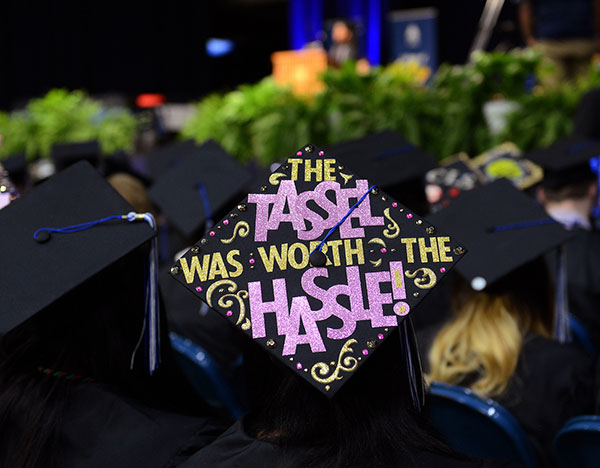Advance Your Path in Communication
Earn your Masters of Arts (MA) in Communication at UIS, one of two Graduate programs of study in Communication. The MA in Communication program offers concentration options in interpersonal communication and journalism/media studies.
Many students participate in the Graduate Public Service Internship (GPSI), which places students in state government positions. These internship opportunities in legislative staffing, public information offices and research offices provide real-world experiences. The GPSI program provides a tuition waiver and a monthly stipend.
Looking specifically to advance your career in Public Affairs or Reporting? Check out the MA in Public Affairs Reporting.
Why Choose Our MA Program?
- Expert Faculty: Learn from diverse professionals with real-world experience
- Hands-On Learning: Internships, industry collaborations and multimedia projects frame your learning to your current or future career aspirations
- Career Success: Alumni are successful in newsrooms, PR firms, nonprofits, government, and multimedia production
- Capstone Options: Students can choose between a thesis, final project or comprehensive exams
What You'll Learn
- Think critically about media and enhance media literacy
- Expand written and oral communication skills to a professional level
- Explore real-world situations and how to respond
- Demonstrate scholarly expertise in your specialization area
- Recognize how diversity, power, and access impact communication
Calendar
Don't miss an important date or deadline
Designed for working professionals, UIS programs feature multiple start dates per year, so you can begin at the time that best fits your schedule and complete your degree quickly. View the Academic Calendar

Tuition & Aid
UIS is the most affordable option to earning your University of Illinois degree. Earn a world-class education for less than you’d expect.
Value of a UIS Degree

UIS is No. 5 for students graduating with the least amount of debt, Midwest Region (2021).

Top 25 best value school, Midwest Region, and the only public university in Illinois on the list (2022, 2023, 2024).

98% of students receive aid
The average graduate from UIS will see an increase in earnings of $31,700 - $69,000 each year compared to someone with a high school diploma working in Illinois.
Admissions
Applying to UIS is simple
We've streamlined our admission process to save you time and effort. Just follow the steps below.
Review admission requirements
No specific admission requirements are listed at this time. Please contact the Office of Admission for more information.
International students, will you need an F-1 student visa to study on campus at UIS? Please review the International Applicants site for additional information.
Complete your application
An email address is required to create an account. To submit a paper application, visit the Resources & Forms page. Find more information about what type of student you are on the Student Types page. Applying for an online program is the same procedure as applying for an on-campus program.
Send your official transcripts
Email your official or certified academic records/transcripts to incomingtranscripts@uis.edu or through any of the major transcript platforms. Photocopies will not be accepted.
Submit required statements/writing sample
If you are a first-year student, a statement of 250-650 words is required for admission. We want to hear about your professional aspirations, intellectual interests, and personal experiences relevant to your choice of a specific academic program. You can upload the required documents on you're application status page.
Pay your application fee
You can submit your non-refundable application fee online, after completing the online application. Alternately, it can also be mailed to the university, payable to University of Illinois Springfield.
Domestic students: Undergraduate - $50, Graduate - $60;
International students: Undergraduate - $60, Graduate - $75.

Courses & Catalog Information
At the University of Illinois Springfield, you'll find a wide range of courses tailored to your interests and career goals. Explore your program details and get all the essential information you need to plan your future.
Career Opportunities
Exploring the following career paths can help you see how your degree opens up a wide range of exciting and rewarding opportunities in various fields.
- Advocate
- Brand Assistant
- Circulation Coordinator
- Deejay/Radio Host
- Columnist
- Digital Illustrator
- Copy Editor
- Community Service Coordinator
- Editorial Clerical Staff
- Employer Relations Coordinator
- Freelance Speech Writer
- Advertising Assistant
- Employment Interviewer
- Graphic Artist/Designer
- Assistant Casting Agent
- Advertising Assistant
- Media Planner
- Marketing Coordinator
- Lobbyist
- Placement Specialist
- Technical Writer
- Events Coordinator
- Research Assistant
- Promotion Coordinator
- Production Staff
- Community Action
- Commentator
- Assistant Media Buyer
- Coordinator of Consumer Affairs
- Creative Writer
- Digital Photographer
- Clerk Typist
- Effects Coordinator
- Community Relations Coordinator
- Lyricist
- Announcer
- Concept Art Designer
- Artist/Designer
- Greeting Card Writer
- Film Editor
- Guest Services Coordinator
- Image Specialist
- News Reporter
- Marketing Assistant
- Page-Layout Technician
- Press Agent Trainee
- Traffic Reporter
- Story Analyst
- Recruiter
- Public Relations Specialist
- Sales Representative
- Print Production Coordinator

